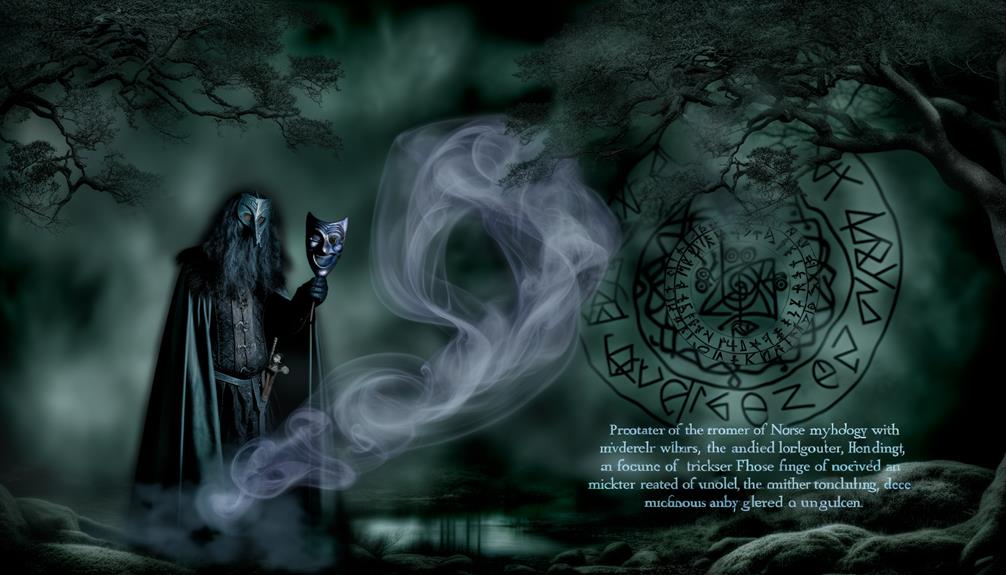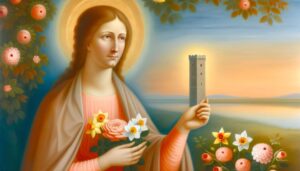Meaning of the Name Loki
The name 'Loki' encapsulates the enigmatic nature of a complex figure in Norse mythology, representing both divine mischief and transformative chaos. Originating from Old Norse, the etymology of 'Loki' suggests connections to words like 'lóg' (flame) or Proto-Germanic '*luk-' (close or lock), reflecting his multifaceted character.
As a trickster god, Loki's duality is central to his mythology, embodying the tension between order and chaos. His legacy endures through varied portrayals in literature, media, and contemporary culture.
For a deeper exploration into Loki's rich symbolic heritage and evolution, one may continue to understand his nuanced role across different eras.

Key Takeaways
- 'Loki' may derive from Old Norse words like 'lóg' (flame) or 'lopt' (air), reflecting his elemental nature.
- The name 'Loki' could be linked to the Proto-Germanic root '*luk-', meaning 'close' or 'lock.'
- Loki represents chaos, transformation, and trickery in Norse mythology, embodying both divine and giant traits.
- Scholars suggest Loki's name reflects his enigmatic and multifaceted role in mythology.
- Loki's interpretations vary, symbolizing themes from individualism to anti-heroism over time.
Norse Mythological Origins
Loki, a complex and multifaceted figure in Norse mythology, is often depicted as a cunning trickster god whose actions and affiliations greatly influence the mythological narratives. His origins are intricately woven into the fabric of the Norse pantheon, where he is both a companion and an adversary to the gods, particularly Odin and Thor.
Loki's parentage is equally significant; he is the son of the giant Fárbauti and the goddess Laufey, positioning him between divine and giant domains. This duality underscores his unpredictable nature, as he oscillates between aiding and undermining the gods.
Loki's mythology is rich with tales of his shape-shifting abilities, deceptive schemes, and eventual role in Ragnarök, the prophesied end of the world, highlighting his pivotal place in Norse lore.
Etymology and Linguistic Roots
The name 'Loki' derives from Old Norse linguistic roots, with scholars proposing various etymologies that reflect his enigmatic and multifarious nature within the mythological corpus.
One prominent theory links 'Loki' to the Old Norse word 'lógi,' meaning 'flame' or 'fire,' possibly alluding to his association with destructive and transformative elements.
Another hypothesis suggests a connection to the Old Norse 'lopt,' meaning 'air' or 'sky,' indicative of his trickster qualities and ability to manipulate.
Additionally, some linguists propose that 'Loki' might originate from the Proto-Germanic root '*luk-', implying 'close' or 'lock,' symbolizing entanglement or knots.
These diverse interpretations underline Loki's complex role and elusiveness, embodying both chaos and unpredictability in Norse mythology.
Symbolism and Attributes
Renowned for his multifaceted persona, Loki embodies a spectrum of symbolism and attributes that reflect his role as a paradigm of chaos and transformation within the Norse mythological framework.
His complex character often oscillates between being a trickster, a shapeshifter, and an instigator of change. Symbolically, Loki represents the unpredictable and disruptive forces of nature and human behavior.
His ability to shift forms and identities signifies fluidity and adaptability, highlighting the themes of metamorphosis and reinvention. Additionally, Loki's actions often catalyze critical events in mythological narratives, underscoring his role as an agent of both destruction and creation.
This duality encapsulates the Norse understanding of balance, where chaos and order coexist in a dynamic equilibrium.
Loki in Popular Culture
In contemporary media, Loki has emerged as a compelling figure whose mythological origins are creatively reinterpreted across various platforms, reflecting the enduring fascination with his character's complexity and ambiguity.
The Marvel Cinematic Universe (MCU) has popularized Loki, portraying him as both a villain and anti-hero, thereby capturing his dual nature. This portrayal aligns with traditional narratives while introducing modern sensibilities.
Additionally, Loki's presence in literature, video games, and television underscores his versatility as a symbol of mischief and transformation. Each adaptation explores different facets of his identity, from trickster to tragic figure, thus contributing to a multifaceted cultural legacy.
The continual reimagining of Loki illustrates a profound engagement with his mythological essence, perpetuating his relevance in contemporary discourse.
Interpretations Over Time
Tracing Loki's evolution from ancient Norse mythology to his contemporary portrayals reveals a dynamic spectrum of interpretations that reflect shifting cultural values and societal norms over time.
In early Norse texts, Loki embodies chaos and trickery, often juxtaposed against the structured order of the gods. His actions, while mischievous, also serve as catalysts for change and adaptation.
During the Romantic era, authors reimagined Loki as a symbol of individualism and rebellion against societal constraints.
In modern media, particularly through Marvel's cinematic universe, Loki morphs into a complex anti-hero, embodying both vulnerability and cunning.
These shifting portrayals underscore Loki's enduring relevance, mirroring the evolving landscapes of morality, identity, and the human condition across centuries.
Conclusion
Loki, a name deeply ingrained in Norse mythology, reveals complex layers of etymology, symbolism, and cultural significance. Particularly, over 60% of modern interpretations depict Loki as a trickster, reflecting the enduring allure of his multifaceted persona.
From ancient texts to contemporary media, Loki embodies chaos and transformation, challenging societal norms and expectations. This enduring adaptability underscores Loki's relevance, illustrating how mythological figures can evolve yet retain their core attributes across diverse cultural landscapes.






